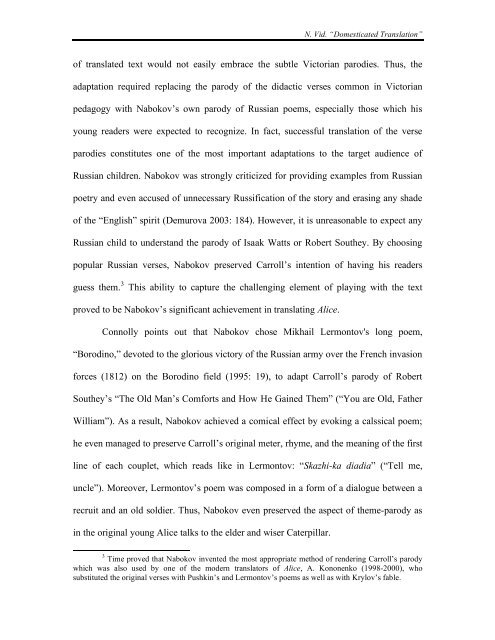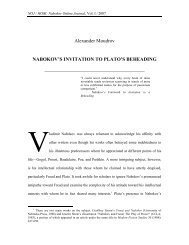domesticated translation: the case of nabokov's translation of alice's
domesticated translation: the case of nabokov's translation of alice's
domesticated translation: the case of nabokov's translation of alice's
You also want an ePaper? Increase the reach of your titles
YUMPU automatically turns print PDFs into web optimized ePapers that Google loves.
N. Vid. “Domesticated Translation”<br />
<strong>of</strong> translated text would not easily embrace <strong>the</strong> subtle Victorian parodies. Thus, <strong>the</strong><br />
adaptation required replacing <strong>the</strong> parody <strong>of</strong> <strong>the</strong> didactic verses common in Victorian<br />
pedagogy with Nabokov’s own parody <strong>of</strong> Russian poems, especially those which his<br />
young readers were expected to recognize. In fact, successful <strong>translation</strong> <strong>of</strong> <strong>the</strong> verse<br />
parodies constitutes one <strong>of</strong> <strong>the</strong> most important adaptations to <strong>the</strong> target audience <strong>of</strong><br />
Russian children. Nabokov was strongly criticized for providing examples from Russian<br />
poetry and even accused <strong>of</strong> unnecessary Russification <strong>of</strong> <strong>the</strong> story and erasing any shade<br />
<strong>of</strong> <strong>the</strong> “English” spirit (Demurova 2003: 184). However, it is unreasonable to expect any<br />
Russian child to understand <strong>the</strong> parody <strong>of</strong> Isaak Watts or Robert Sou<strong>the</strong>y. By choosing<br />
popular Russian verses, Nabokov preserved Carroll’s intention <strong>of</strong> having his readers<br />
guess <strong>the</strong>m. 3 This ability to capture <strong>the</strong> challenging element <strong>of</strong> playing with <strong>the</strong> text<br />
proved to be Nabokov’s significant achievement in translating Alice.<br />
Connolly points out that Nabokov chose Mikhail Lermontov's long poem,<br />
“Borodino,” devoted to <strong>the</strong> glorious victory <strong>of</strong> <strong>the</strong> Russian army over <strong>the</strong> French invasion<br />
forces (1812) on <strong>the</strong> Borodino field (1995: 19), to adapt Carroll’s parody <strong>of</strong> Robert<br />
Sou<strong>the</strong>y’s “The Old Man’s Comforts and How He Gained Them” (“You are Old, Fa<strong>the</strong>r<br />
William”). As a result, Nabokov achieved a comical effect by evoking a calssical poem;<br />
he even managed to preserve Carroll’s original meter, rhyme, and <strong>the</strong> meaning <strong>of</strong> <strong>the</strong> first<br />
line <strong>of</strong> each couplet, which reads like in Lermontov: “Skazhi-ka diadia” (“Tell me,<br />
uncle”). Moreover, Lermontov’s poem was composed in a form <strong>of</strong> a dialogue between a<br />
recruit and an old soldier. Thus, Nabokov even preserved <strong>the</strong> aspect <strong>of</strong> <strong>the</strong>me-parody as<br />
in <strong>the</strong> original young Alice talks to <strong>the</strong> elder and wiser Caterpillar.<br />
3 Time proved that Nabokov invented <strong>the</strong> most appropriate method <strong>of</strong> rendering Carroll’s parody<br />
which was also used by one <strong>of</strong> <strong>the</strong> modern translators <strong>of</strong> Alice, A. Kononenko (1998-2000), who<br />
substituted <strong>the</strong> original verses with Pushkin’s and Lermontov’s poems as well as with Krylov’s fable.
















